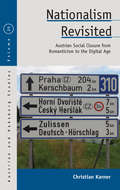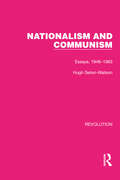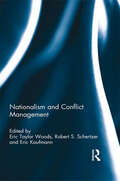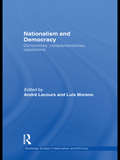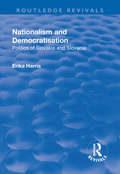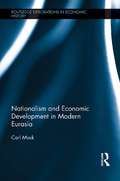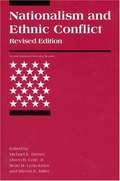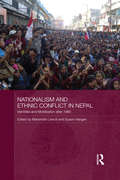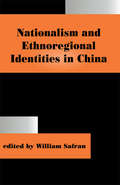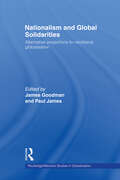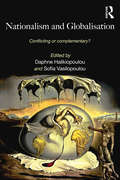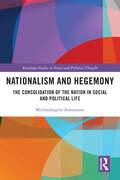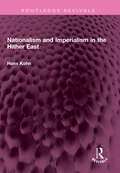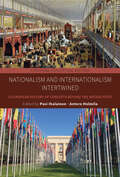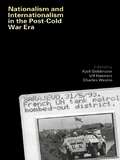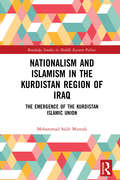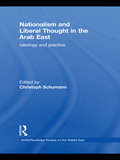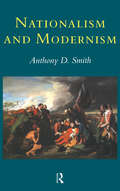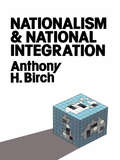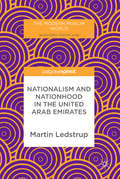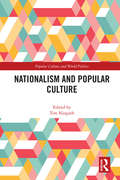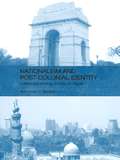- Table View
- List View
Nationalism Revisited: Austrian Social Closure from Romanticism to the Digital Age (Austrian and Habsburg Studies #25)
by Christian KarnerFocused on the German-speaking parts of the former Habsburg Empire, and on present-day Austria in particular, this book offers a series of highly innovative analyses of the interplay of nationalism’s discursive and institutional facets. Here, Christian Karner develops a distinctive perspective on Austrian nationalism over the longue durée, tracing nationalistic ways of thinking and mobilizing from the late eighteenth century to the present. Through close analyses of key texts representing diverse settings and historical episodes, this book traces the connections, continuities and ruptures that have characterized the varieties of Austrian nationalism.
Nationalism and After: With a new Introduction from Michael Cox
by E.H. CarrPublished in 1945, Nationalism and After was a best-selling classic in its own time which sparked intense debate when it first appeared and has continued to do so ever since. Authored in a moment of hope, E.H. Carr’s uncompromising critique of nationalism and plea for a more rational international order remains as relevant today as it did when it was first written. As the world is once again confronted by a rising tide of nationalism, Nationalism and After remains a beacon of hope in an era where reasoned critical analysis has never been more urgently required. It is here reissued in full with a new, definitive introduction by leading Carr scholar, Michael Cox.
Nationalism and Communism: Essays, 1946–1963 (Routledge Library Editions: Revolution #17)
by Hugh Seton-WatsonThis book, first published in 1964, collects a number of essays united by the general theme of national and social revolution. They examine features of revolutionary movements, and, particularly, revolutionary leadership in an analysis of the social conditions and personal motives which impel men towards forming revolutionary elites.
Nationalism and Conflict Management
by Eric Taylor Woods Eric Kaufmann Robert S. SchertzerEthno-national conflict is one of the central issues of modern politics. Despite the emergence of approaches to managing it, from nation-building to territorial autonomy, in recent years, the application of these approaches has been uneven. Old conflicts persist and new ones continually emerge. The authors of this book contend that what is needed to drive forward the theory and practice of ethno-national conflict management is a more nuanced understanding of ethnicity and nationalism.The book addresses this issue by linking theories of ethnicity and nationalism to theories of conflict management. Its contributors share a common goal of demonstrating that a nuanced understanding of ethnicity and nationalism can beneficially inform conflict management in theory and practice. To do so, they analyse both hot and cold conflict zones, as well as cases that have been important in the development of the most widely-used conflict management models.The book is aimed at those interested in the theory and practice of ethno-national conflict management as well as the study of ethnicity and nationalism. It is well-suited for undergraduate and advanced research students, experts and policy-makers.This book was originally published as a special issue of Commonwealth and Comparative Politics.
Nationalism and Democracy: Dichotomies, Complementarities, Oppositions (Routledge Studies in Nationalism and Ethnicity)
by André LecoursThis book sheds light on the complicated, multi-faceted relationship between nationalism and democracy by examining how nationalism in various periods and contexts shapes, or is shaped by, democratic practices or the lack thereof. This book examines nationalism’s relationship with democracy using three approaches: The challenge of democracy for sub-state nationalism: analyzing the circumstances under which sub-state nationalism is compatible with democracy, and assessing the democratic implications of various nationalist projects. The impact of state nationalism on democratic practices: examining the implications of state nationalism for democracy, both in countries where liberal democratic principles and practices are well-established and where they are not. Understanding how state nationalism affects democratization processes and what impact sub-state nationalism has in these contexts. Featuring a range of case studies on Western, Eastern and Central Europe, Russia, African and the Middle East, this book will be of interest to students and scholars of political science, sociology, nationalism and democracy.
Nationalism and Democratisation: Politics of Slovakia and Slovenia (Routledge Revivals)
by Erika HarrisThis title was first published in 2002: The year 1989 marks a turning point in world history. The rigid division of Europe into East and West and the bipolarity of the Cold War system disintegrated, with communism as a political system dismantled by 1991. In the wake of the communist multinational federations came successor states, with each accompanied by many ethnic and national conflicts. This book is concerned with the relationship between nationalism and democracy in a particular setting - the larger framework is postcommunist Eastern and Central Europe, the focus is on newly dependent democracies, explored through the case studies of Slovakia and Slovenia. The purpose is to seek an answer to two related questions: what is the role of nationalism in the democratic process?; and under what conditions is nationalism less or more compatible with the democratisation process?
Nationalism and Economic Development in Modern Eurasia (Routledge Explorations in Economic History #62)
by Carl MoskThis book advances a new theory of why nationalism emerged in the modern world. In particular it explains why nationalism and economic development are closely linked, and why warfare plays a crucial role in the spread of the nation-state system. It is based on qualitative and quantitative evidence over the period 1600 to 2000 for seven countries – Great Britain, France, Germany, Yugoslavia, the United States, Japan and China
Nationalism and Ethnic Conflict (Revised Edition)
by Michael E. Brown Owen R. Coté Sean M. Lynn-Jones Steven E. MillerMost recent wars have been complex and bloody internal conflicts driven to a significant degree by nationalism and ethnic animosity. Since the end of the Cold War, dozens of wars -- in Bosnia, Kosovo, Rwanda, Somalia, the former Soviet Union, and elsewhere -- have killed or displaced millions of people. Understanding and controlling these wars has become one of the most important and frustrating tasks for scholars and political leaders. This revised and expanded edition of Nationalism and Ethnic Conflict contains essays from some of the world's leading analysts of nationalism, ethnic conflict, and internal war. The essays from the first edition have been updated and supplemented by analyses of recent conflicts and new research on the resolution of ethnic and civil wars. The first part of the book addresses the roots of nationalistic and ethnic wars, focusing in particular on the former Yugoslavia. The second part assesses options for international action, including the use of force and the deployment of peacekeeping troops. The third part examines political challenges that often complicate attempts to prevent or end internal conflicts, including refugee flows and the special difficulties of resolving civil wars.
Nationalism and Ethnic Conflict in Nepal: Identities and Mobilization after 1990 (Routledge Contemporary South Asia Series)
by Mahendra Lawoti Susan HangenIdentity movements, based on ethnicity, caste, language, religion and regional identity, have become increasingly significant in Nepal, reshaping debates on the definition of the nation, nationalism and the structure of the state. This book analyzes the rapid rise in ethnic and nationalist mobilization and conflict since 1990, the dynamics and trajectories of these movements, and their consequences for Nepal. From an interdisciplinary perspective, the book looks at the roots of mobilization and conflicts, the reasons for the increase in mobilization and violent activities, and the political and social effects of the movements. It provides a historical context for these movements and investigates how identities intersect with forms of political and economic inequality. Nepal’s various identity groups - Dalits, indigenous nationalities, Madhesis and Muslims - have mobilized to different extents. By examining these diverse movements within the same time period and within a unitary state, the book illuminates which factors are more salient for the mobilization of identity groups. Bringing together empirical contributions on key issues in identity production in a comparative perspective, the book presents an interesting contribution to South Asian studies as well as studies of nationalism and identity more broadly.
Nationalism and Ethnoregional Identities in China (Routledge Studies in Nationalism and Ethnicity)
by William SafranWestern political scientists have tended to neglect the ethnic dimension in China, and have overemphasized the development from large empire to unified nation. This book brings together a number of case studies on the ethnic and regional dimensions of Chinese politics and society.
Nationalism and Global Solidarities: Alternative Projections to Neoliberal Globalisation (Routledge Studies in Globalisation)
by James Goodman Paul JamesEven in the face of neoliberal globalization, nationalism remains a significant political force. The leading contributors to this new volume explore the extent to which nationalism can be a foundation for alternative solidarities. Against the axiom that with globalization ‘all that is solid melts into air,’ this anthology debates the extent to which different forms of solidarity remain viable - from the solidarities of local political groups to the solidarities of nationalism, internationalism and alternative globalisms. Organized into three sections, the book addresses the relationship between the contemporary formations of nationalism, globalism and solidarity movements: Part 1 offers a framework for understanding globalization and discusses the effect of globality on nationalism Part 2 addresses the logics of nationalisms in globalizing contexts: respectively, liberal nationalism, left nationalism, post-colonial nationalism, and revivals of nationalism Part 3 addresses issues of solidarity and integration in a world of nationalism and globalism, asking how differing forms of connectivity may be emerging, disrupting prevailing oppositions and relations, focusing on social movements and solidarity. Offering the first detailed study of the relationship between globalization and nationalism, Nationalism and Global Solidarities will be of strong interest to students and scholars of politics, sociology and international political economy.
Nationalism and Globalisation: Conflicting or Complementary?
by Daphne Halikiopoulou and Sofia VasilopoulouNationalism and globalisation are two central phenomena of the modern world, that have both shaped and been shaped by each other, yet few connections have been made systematically between the two. This book brings together leading international scholars to examine the effect of globalisation on nationalism, and how the persistence of the nation affects globalisation. With a range of case studies from Europe, the US and Asia, the authors focus on the interaction between globalisation, national identity, national sovereignty, state-formation and the economy. Part one provides theoretical reflections on the flexibility and plasticity of the terms nationalism and globalisation focusing on the ways in which nationalism has shaped and has been shaped by globalising forces. Part two examines the relationship between nationalism and globalisation in different historical eras and different regions, questioning established approaches. Part three focuses on contemporary issues including the economic crisis, labour migration and citizenship and the theme of global culture. The result is a highly topical account that considers the conceptual landscape of Nationalism and Globalisation. With an interdisciplinary approach, Nationalism and Globalisation will be of interest to students and scholars of political science, sociology, history, economics and international relations.
Nationalism and Hegemony: The Consolidation of the Nation in Social and Political Life (Routledge Studies in Social and Political Thought)
by Michaelangelo AnastasiouThis book develops a contemporary theory of nationalism that addresses 21st century political challenges, exploring theoretical and empirical understandings of the concepts of ‘the nation’ and ‘nationalism’ and the failure of various theoretical accounts to decipher the diverse manner by which nationalism comes to be embedded in our social and political world. Accounting for the dynamism and ‘intertextuality’ of nationalism, Nationalism and Hegemony shows how ‘the nation’ and ‘nationalism’ come to be consolidated as conceptual and experiential power structures and how the interests of political groups are advanced through diverse nationalist modalities, which can at any time be activated for political purposes. A critique of the various and diverse manifestations of nationalism, this contribution to both theory and political practice will appeal to scholars working in the fields of sociology and social and political theory.
Nationalism and Human Rights
by Grace ChengThis collection of essays offers a comprehensive discussion of the challenge of promoting human rights in the face of nationalism's persistence as an ideological and mobilizational force in politics.
Nationalism and Imperialism in the Hither East (Routledge Revivals)
by Hans KohnFirst published in 1932, Nationalism and Imperialism in the Hither East seeks to present the history of Turkey, Egypt and Arabia in the decade where the political structures created by World War I and the Peace Conferences sought consolidation and the evolution of their own life. The story begins where, after the immediate consequences of the War had been liquidated, the civil and political administration of the several countries was established. This book is intended as contribution to the endeavour to understand the historical and sociological character of nationalism and of the forces which are determining the history of our own day. The social, political, and cultural movements in these countries, the struggle between imperialism and nationalism throw light upon the processes which extend far beyond the region under consideration. The language used is a reflection of its era and no offence is meant by the Publishers to any reader by this republication. This book will be of interest to students of history, political science, international relations, and geography.
Nationalism and Internationalism Intertwined: A European History of Concepts Beyond the Nation State (European Conceptual History #7)
by Pasi Ihalainen Antero HolmilaIt is commonplace that the modern world is more international than at any point in human history. Yet the sheer profusion of terms for describing politics beyond the nation state—including “international,” “European,” “global,” “transnational” and “cosmopolitan,” among others – is but one indication of how conceptually complex this field actually is. Taking a wide view of internationalism(s) in Europe since the eighteenth century, Nationalism and Internationalism Intertwined explores discourses and practices to challenge nation-centered histories and trace the entanglements that arise from international cooperation. A multidisciplinary group of scholars in history, discourse studies and digital humanities asks how internationalism has been experienced, understood, constructed, debated and redefined across different European political cultures as well as related to the wider world.
Nationalism and Internationalism Intertwined: A European History of Concepts Beyond the Nation State (European Conceptual History)
by Pasi Ihalainen Antero HolmilaIt is commonplace that the modern world is more international than at any point in human history. Yet the sheer profusion of terms for describing politics beyond the nation state—including “international,” “European,” “global,” “transnational” and “cosmopolitan,” among others – is but one indication of how conceptually complex this field actually is. Taking a wide view of internationalism(s) in Europe since the eighteenth century, Nationalism and Internationalism Intertwined explores discourses and practices to challenge nation-centered histories and trace the entanglements that arise from international cooperation. A multidisciplinary group of scholars in history, discourse studies and digital humanities asks how internationalism has been experienced, understood, constructed, debated and redefined across different European political cultures as well as related to the wider world.
Nationalism and Internationalism in the Post-Cold War Era
by Ulf Hannerz Kjell Goldmann Charles WestinThe tension between nationalism and internationalism has been a major feature of world politics since the end of the Cold War. Based on a Nobel symposium, this collection brings together an international selection of acclaimed authors from a wide variety of academic disciplines. The book combines focused case-studies and more theoretically based material to examine critically the post-Cold War political landscape. Subjects covered include:* changing interpretation of the nation state and nationalism* the growing prominence of transnational organisations* technological changes in information, communication and transport* multiculturalism and citizenship*ethnicity and religious identity in African, Indian, Bosnian and Polish nationalism* the growing global significance of Islam.
Nationalism and Islamism in the Kurdistan Region of Iraq: The Emergence of the Kurdistan Islamic Union (Routledge Studies in Middle Eastern Politics)
by Mohammad Salih MustafaExploring a new political phenomenon in the Middle East, this book studies the reconciliation of nationalism and Islamism by Islamic political parties in the context of nation states. Islamism in Kurdistan has become significantly framed by the politics of nationalism. Although the concept of religious nationalism has been discussed substantially before, this work highlights a new brand of religious nationalism that has emerged as a result of intertwining nationalism and Islamism. The focus of this study is on the development of religious nationalism in the continuously tumultuous region of the Middle East. The volume investigates whether Islamism in Kurdistan is limited by the politics of nationalism – which is an accentuated example for the whole Middle East region. By looking at the Kurdistan Islamic Union (KIU), the research studies Islamism in the Kurdistan Region to elaborate on this new type of politics. This is essentially due to the absence of a politically recognised nation state, which renders Kurds to be particularly susceptible to various manifestations of nationalism. Offering an account on the spread of the Muslim Brotherhood in the Kurdistan Region, this original research on Kurdish nationalism will be a key text for students and researchers interested in nationalism, Islamism and Middle East politics.
Nationalism and Liberal Thought in the Arab East: Ideology and Practice (SOAS/Routledge Studies on the Middle East)
by Christoph SchumannThis book explores the complex relationship between nationalism and liberal thought in the Arab East during the first half of the twentieth century. Examining this formative period through reformist Islam, Arab secularism and Arab literature, the book situates major shifts in the political ideologies and practices of Arab liberals within a historical context. Contributions from renowned scholars in the field show how rather than fundamentally contradicting each other, these two schools of thought are closely linked. Many key demands of liberalism - most notably constitutionalism, the rule of law, individual rights, and popular participation - have been central to the nationalist agenda, while other issues have proven more controversial: inter-confessional tolerance, secularism, and the goals of state-sponsored education. Although a strong nation-state was pivotal to the nationalist imagination during most of the twentieth century, a powerful critique of unchecked state power took shape as Arab countries experienced a half-century of authoritarian government. In analyzing these issues, the chapters demonstrate how the rise and fall of liberalism across the region was not determined solely by religion or culture, but by the ideas of influential intellectuals and politicians. Advancing our understanding of political ideology and practice in the Arab East, this volume will be of great interest to students and scholars of political science, history and the Middle East.
Nationalism and Modernism: A Critical Survey Of Recent Theories Of Nations And Nationalism
by Anthony Smith Prof Anthony SmithThe first major study in over three decades to explore the essential arguments of all the major theoretical interpretations of nationalism, from the modernist approaches of Gellner, Nairn, Breuilly, Giddens and Hobsbawm to the alternative paradigms of van den Bergh and Geertz, Armstrong and Smith himself. In a style accessible to the student and the general reader Smith traces the changing view of this hotly discussed topic within the current political, cultural and socioeconomic arena. He also analyses the contributions of such historians, sociologists and political scientists as Seton-Watson, Reynolds, Hastings, Horowitz and Brass. The survey concludes with an analysis of post-modern approaches to national identity, gender and nation, making it indispensable reading to all those interested in gaining full and authoritative knowledge of nationalism.
Nationalism and National Integration
by Anthony H. BirchNationalist theories are still controversial, while the process and frequent failures of national integration are issues of central importance in the contemporary world. Birch's argument is illustrated by detailed and topical case studies of national integration in the United Kingdom, Canada and Australia: the United Kingdom, with the Welsh, the Scots, the Irish and the coloured minorities; Canada, with its Anglo-French tensions, its cultural pluralism and its indigenous peoples claiming the right of self-government; Australia, with its increasing ethnic diversity and its failure to integrate the Aborigines.
Nationalism and Nationhood in the United Arab Emirates (The Modern Muslim World)
by Martin LedstrupThis book shows how an encounter with everyday nationhood in the northern United Arab Emirates can make us revisit the classics of sociology as continuous analytical world-views. Through the textual universe of Georg Simmel, and in particular his analysis of modern life as the feeling of dualism, the project reflects about how seemingly crucial challenges to the national – the forces of globalization and the wish to be unique – are drawn together with the formation of nationhood in everyday life. It does so not least by attending to the instances of everyday nationhood – like fashion and car-driving – that are at the same time central ways of embodying the modern. This volume appeals to students of nationalism, classical sociology, and the modern Arab Gulf.
Nationalism and Popular Culture (Popular Culture and World Politics)
by Tim NieguthHow do nations come to shape our collective imagination so profoundly? This book argues that the power of national identity and national belonging stems, in part, from the ways in which nationalism is embedded in popular culture. Comprised of chapters covering a wide range of cases from both the Global North and Global South (including Argentina, Australia, Canada, Europe, Israel, Pakistan, and the United States), the text unpacks the connections between nationalism and film, television, music, and other facets of everyday culture. In doing so, it demonstrates that popular culture can help us understand why and how nationhood has become so deeply entrenched in modern society. This book will be of interest to scholars of political science, nationalism, sociology, history, media studies, and cultural studies.
Nationalism and Post-Colonial Identity: Culture and Ideology in India and Egypt
by Anshuman A MondalHow have nations and nationhood become the dominant form of political organization today? What is the role of culture in nationalism? In what ways have the ideological development of nationalisms in the post-colonial world shaped understandings of contemporary political problems such as the rise of radical Islam, communalism, and the failure of secular-liberal democracy? This book offers the first comparative study of two highly significant anti-colonial nationalisms. Its close analysis of nationalist discourse in India and Egypt is situated within a new theoretical framework for studying nationalism, based on a trenchant critique of theorists such as Benedict Anderson, Ernest Gellner, Eric Hobsbawm and Anthony Smith.
